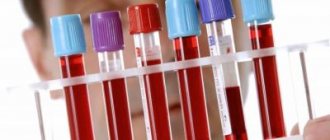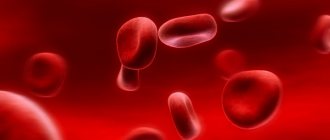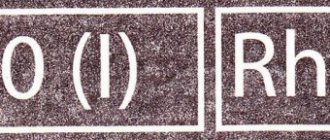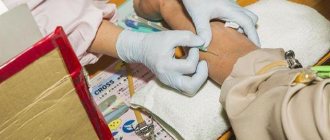Read interesting information about people with negative Rh factor blood.
Blood is one of the most important components of the internal environment of the human body. It consists of numerous structures and chemicals.
- A class of substances that plays a significant role in the implementation of vital processes at the level of blood cells are proteins.
- Some proteins are part of the human Rh system and are located on the surface of red blood cells - erythrocytes that are directly involved in the transport of hemoglobin in the bloodstream.
- The Rh factor can be positive or negative.
- People often have a question: are those with negative Rh factor blood special individuals?
- After all, it is generally accepted that there are fewer such people, and they are even attributed to aliens.
What are the characteristics of these people? Why can the Rh factor be negative at all? Are there many famous people with negative Rh factor? Find answers to these and other questions in this article.
People with negative Rh factor blood are aliens or descendants of Gods: theory
Special people have negative Rh factor blood.
The reason for the appearance of people with a protein missing in the blood still remains a mystery to scientists studying this issue. According to various studies, the approximate time that is used to calculate the period of existence of a negative Rh factor in humans has been established - 35 thousand years. Therefore, many people have a question: are people with negative Rh factor blood aliens or descendants of the Gods? The answer is theory:
- Various theories of the origin of this feature are being considered, however, none of them is finally accepted in scientific circles due to the lack of reliable facts and evidence.
- One can even say that the available information about the organisms of that distant time and the current period of development of living organisms, on the contrary, is a refutation of the possibility of a process that has already occurred.
- For example, one of the most surprising findings is the realization by scientists of the fact that none of the supposed human ancestors had a negative Rh factor.
- The same applies to modern apes - all individuals within each species are Rh positive.
The theory according to which these changes occurred due to mutation seems quite plausible. However, there is no evidence of this, so all the data creates some confusion. On the basis of such contradictory information, one of the most fantastic theories of the appearance of a negative Rh factor in humans was put forward, in which a transformative role is assigned to alien influence.
Interesting: Within the framework of this idea, it is assumed that an alien invasion was carried out, as a result of which the connection between supposedly Rh-negative aliens and earthlings became possible.
Thus, in accordance with the cosmic theory of ufologists, the ancestors of people with Rh(-) are ancient aliens.
However, this theory, like all existing ones on this issue, has not been scientifically confirmed. Therefore, to claim that people with negative Rh factor blood are aliens would be unreasonable at the moment.
Different blood types appeared at different times
Many researchers agree that the “oldest” blood group can be called the first blood group. Its owners were ancient hunters who obtained food by tracking down representatives of the fauna. Thousands of years later, some hunters decided to “retrain” as farmers, which led to changes in their diet and, as a result, led to physiological changes. This is how the second blood group began to form, which was characteristic of tribes leading a sedentary lifestyle. When humanity decided to explore new lands, this became the beginning of the formation of the third blood group, which is also called “the blood of travelers.” Then scientists identified a fourth group and learned to determine Rh factors. But it was the third blood group that presented modern researchers with the most mysteries and surprises.
A study published in the journal Neurology in 2014 found that about 11 percent of people on the planet today are carriers of the third blood type. One of the versions of its origin is a mutation that occurred over a long time in the Mongoloid race prone to nomadic life. According to another version, the third group originated among the Jews after the exodus from Egypt. As a serious argument, researchers cite the fact that carriers of this blood type are very common among Jews.
Ajit Varki, a biologist from the University of California at San Diego, believes that so far science cannot explain why humanity was divided into carriers of different blood groups and what the meaning of such a division was. However, this does not prevent scientists from studying the characteristics of these groups.
According to naturopath Peter D'Adamo, type 3 blood originated in our ancestors 10,000 to 15,000 years ago in the Himalayas. Since ancient times, these lands have been considered a place where mysterious aliens came into contact with the local population and gave them knowledge and technology unprecedented on Earth. So we cannot exclude the extraterrestrial origin of the third blood group - this theory has many adherents.
More realistic researchers, including a group of scientists from the University of Tokyo in Japan, believe that it was changes in climate and nutrition that caused the transformation of the blood of ancient settlers from the African tropics. These traveling tribes migrated to the difficult conditions of mountainous terrain with thin air, and it was those migrants who began to develop the third blood group who were able to survive.
Why can't we clone people with Rh negative blood?
It is impossible to clone people with a negative Rh factor of blood.
It is impossible to clone people with a negative Rh factor of blood due to the fact that mothers who do not have RhD protein in their blood are not always able to bear a child.
The mother's body reacts to fetal blood proteins, perceiving them as a foreign object. Antibodies seek to destroy fetal blood cells, which can lead to its death.
Problem filter
I heard that the problem of Rh sensitization can be solved with the help of plasmapheresis. But can pregnant women do this?
Margarita, Yaroslavl
– Not only is it possible, but it is also necessary! By removing antibodies that are harmful to the fetus from the bloodstream or reducing their concentration, plasmapheresis (blood purification method) is a very effective prevention of Rh conflict. True, if a woman has so-called complete antibodies in her blood, which are slowly synthesized and more difficult to pass the placental barrier. It is much more difficult to “pull out” a pregnancy with incomplete antibodies: they are synthesized in 10–14 hours, and it is impossible to “cleanse the blood” every day. Minimum – in 1–1.5 days. In order to maintain a normal antibody titer, some women have to undergo this procedure throughout their pregnancy.
Plasmapheresis has become a real lifesaver in the treatment of toxicosis in the first and second half of pregnancy, as well as in placental insufficiency, which is the main cause of intrauterine hypoxia (oxygen starvation) and fetal growth retardation.
How many people have Rh negative blood factor - quantity: what percentage?
As already mentioned, the number of Rh-positive people significantly exceeds the number of Rh-negative ones. But how many such people are there, what is the percentage?
- According to rough estimates, the percentage of the latter is about 15% of the planet's population .
However, it should be taken into account that this group is distributed extremely unevenly. The territories with the highest concentration of people with Rh(-) are Europe, especially its Western part, and the Caucasus.
Why do people have negative Rh factor blood?
Negative Rh factor of blood
As has already been said, the very initial emergence of a negative Rh factor among representatives of the species “Homo sapiens” is a serious evolutionary mystery. Despite the existence of numerous hypotheses for the development of events 35 thousand years ago, this question still remains open, and it is impossible to unequivocally answer why people have a negative Rh blood factor. But it is worth noting the following:
- The Rh factor is transmitted from ancestors to descendants through autosomal (non-reproductive) cells.
- RhD protein in the blood is a dominant trait, and its absence is a recessive trait.
2 signs in his cells , but their combination can be different:
- Rh(+)Rh(+) (homozygous dominant)
- Rh(+)Rh(-) (heterozygote)
- Rh(-)Rh(-) (homozygous recessive)
A dominant trait, if present, always overlaps and suppresses a recessive one, but the person still remains a carrier of a negative Rh factor. It follows from this that a negative Rh factor in a person can be due to the same in both parents (homozygous recessive) or if at least one of them has recessive genes.
Do people with negative Rh factor blood not get sick?
Negative Rh factor of blood
People with a negative Rh factor are no less likely than Rh positive people to get sick and are exposed to many diseases. However, there are some differences in susceptibility to certain somatic and mental disorders.
It should be noted that these predispositions are gender specific:
- Men with Rh(-) are most susceptible to mental disorders, allergies, liver diseases, and infectious diseases. However, such men have a significantly lower tendency to digestive disorders and gallbladder diseases.
- Women with Rh(-) are most prone to psoriasis, scoliosis, diabetes, and urinary tract infections. However, they are less susceptible to dermatitis and various mental disorders.
In general, scientists conclude that, in addition to the specific disorders listed above, Rh-negative people, regardless of gender, often have cardiovascular, immune and respiratory disorders. However, at the same time, their bodies cope more effectively with infectious diseases.
Don't need stock?
I will soon have major heart surgery. But I have Rh negative blood. They say that in such cases you need to go to a blood transfusion station and donate it “in reserve” - in case of bleeding. Is it worth doing?
Vsevolod, Moscow
Article on the topic
Where to donate blood faster and cheaper?
– Rh negative blood is always in short supply. But, if we are talking about a planned operation, like yours, the medical institution, as a rule, orders blood for it in advance. Especially if the risk of bleeding is expected.
A difficult situation with Rh-negative donor blood can arise in the event of an emergency operation, when a person is admitted to the hospital after a traffic accident or other accident. You can't think about it anymore. We need to act. How? Contact blood transfusion stations located in large (preferably federal) medical centers. Or look for the blood you need in the city’s medical network. If it was not possible to resolve this issue in this way, you need to call out friends and acquaintances or go to the nearest military or fire station and look for voluntary donors with the blood Rh blood you need.
By the way, when getting ready for surgery, remember if you have ever had a massive blood transfusion (blood transfusion). In this case, you need to select donor blood especially carefully. Otherwise, with your next blood transfusion, you may experience serious or even life-threatening problems, regardless of your Rh factor.
Negative Rh blood factor: features of people of 3 blood groups
Negative Rh factor of blood
There are 4 human blood groups. The most interesting to consider is negative group 3 . The following features of this group of people with negative Rh factor blood are distinguished:
- Mood instability
- Patience and diplomatic approach towards people
- Vivid emotional expression
- Good speaking skills
- Specific taste preferences, expressed in a special love for dairy products
Women have a highly developed cleanliness and desire for order. Men exhibit leadership qualities and increased demands on others.
Famous people with Rh negative blood: list
Famous people with negative Rh factor blood
Famous people with negative Rh factor blood: list There are quite a lot of representatives of the Rh negative group. Here is a list of famous people with this feature:
Among the royal family:
- Elizabeth II
- Philip I
Among the US ruling elite of different times:
- John Kennedy
- George Bush Senior
- Bill Clinton
- Barack Obama and others
Among the media representatives:
- Brad Pitt
- Angelina Jolie
- Tom Cruise
- Marilyn Monroe
- Elvis Presley
- Leonardo DiCaprio
- Jackie Chan
- Charlie Chaplin
- Robert Pattison
- Jennifer Garner and others
In Russian show business, the government and among famous people who lived a long time ago, there are also representatives of this Rh factor, as well as in other countries.
Community of people with negative Rh blood factor
Community of people with negative Rh factor blood
Similar communities of people with negative Rh factor blood gather in various social networks. Their goal is to create an information base to quickly find a donor in emergency cases.
Important to know: Only people of the same group can become blood donors for Rh-negative people.
Otherwise, when blood is transfused from Rh(+) person to a Rh(-), agglutination (sticking together) of red blood cells will occur in the recipient’s body, which will lead to death.
What is Rhesus?
The Rh factor became known only in 1940. This feature of the blood was discovered by doctors of medical sciences Philip Levin and Rufus Stetson. Rhesus itself is a protein found on the surface of red blood cells. If such a protein is present on these cells, then the blood is Rh positive. When there is no such protein, a person becomes a representative of the rare Rh-.
Blood Rh factor
Today, this discovery helps save thousands of lives. Rh is especially important during pregnancy and blood transfusions. If a woman has Rh-blood and the fetus is positive, then the risk of developing Rh-conflict increases sharply.
Important! In such a situation, the fetal antibodies are severely attacked by the mother's antibodies, which can lead to the death of the child. The situation can only be saved by timely introduction of anti-Rhesus serum into the mother’s body, which suppresses the mother’s immune system.
During blood transfusion, the Rh factor is checked at the stage of testing for compatibility of the recipient's blood. Knowledge of this characteristic saves lives during emergency blood transfusions and organ transplants.
All this makes it necessary to study the characteristics of people with (-) Rh factor, and their differences from the remaining 85% of the planet's population. The question of how many people have Rh negative is increasingly being raised at international forums and conferences, as entire scientific companies are studying the characteristics of these people.
Rh conflict during pregnancy: treatment if the pregnant woman has negative Rh blood factor
Rh conflict during pregnancy
A Rh negative woman may experience difficulty in bearing and giving birth to a child. The reason may be conception from an Rh-positive man and, accordingly, the development of the same Rh-positive fetus in the womb.
- The fact is that the child’s blood proteins, given to him by his father, are foreign to the mother’s body.
- Her body, noticing foreign compounds, produces antibodies designed to destroy the red blood cells of the fetus - this is called Rh conflict during pregnancy.
What treatment is prescribed if a pregnant woman has negative Rh blood factor? Here are a few nuances:
- Usually, starting from the second pregnancy with the same ratio of Rh factors, the existing antibodies begin to show activity.
- They are transported from the mother’s bloodstream to the fetus’s circulatory system through the placenta and, with their destructive actions, can lead to his death.
- Treatment is often based on the mother's defense mechanism.
- Naturally, it may not help and this will lead to termination of pregnancy due to the death of the fetus.
- However, doctors are using every chance to save the baby and not harm the mother.
Containing the harmful effects of antibodies on the blood proteins of a pregnant child is carried out by administering immunoglobulin under the supervision of specialists.
Genetic features of the Rh factor and diagnostic capabilities
As part of the Rhesus blood group Rh factor), C, c, E and e. The proteins that form these antigens are encoded by 2 genes: RHD (D antigen ) and RHCE (antigens C, c, E and e). These genes and the proteins they produce are very similar. This similarity complicates genotyping for these genes. The fact is that to assess the risk of developing a Rh conflict, you need to know the probability of an Rh+ embryo in each couple planning a pregnancy. To calculate this probability, it is necessary to establish the genotype of the father and mother for the RHD gene.
Women with a negative Rh factor are primarily at risk . If the partner also has an Rh-negative status, then the pregnancy will definitely proceed without the development of an Rh conflict and such a couple will not need additional examinations. Women with a negative Rh factor are primarily at risk . If the partner also has an Rh-negative status, then the pregnancy will definitely proceed without the development of an Rh conflict and such a couple will not need additional examinations.
If the father is homozygous, that is, both homologous chromosomes carry a full-fledged RHD gene, then the probability of obtaining an Rh+ embryo in such a pair is 100%, since for a positive Rh factor you need at least one chromosome with this gene, which will definitely come from a homozygous Rh+ father . In this case, the geneticist will not be able to offer anything as a way to prevent Rh conflict and the couple should consult a doctor managing the pregnancy. The doctor will draw up an individual plan for the prevention of Rh conflict.
If a man does not have the RHD , then there is a 50% chance that among the embryos there will be Rh negative ones, with which the pregnancy will proceed without complications from the Rh factor.
However, the high similarity in the sequences of the RHD and RhCE genes complicates not only the diagnosis of these genes and the Rhesus blood group, but also the assessment of the risks of developing a Rhesus conflict. Other mammals have only one gene, which is more similar to human RhCE. Presumably, in humans, the RHD gene appeared as a duplicate of RhCE and changed slightly over time, finding its function in the body. Thus, one of the main features of the genetic diagnosis of the Rh factor is the analysis of several loci of this gene. The fact is that due to the similarity of genes, analysis of one locus with a high probability for a diagnostic test can give a false positive answer, that is, instead of a heterozygote for deletion of the RHD gene, we will see a homozygote with two copies of RHD due to the fact that a false contribution will be made to the analysis RhCE gene. For accurate diagnosis, our laboratory uses the modern MLPA , based on the analysis of a large number of points in these genes at once, which allows not only to accurately diagnose the absence/presence of the RHD gene, but also to identify its other features, which we will discuss further in the next article on our website. Using this method, it is possible to genotype future parents with high accuracy and carry out invasive prenatal diagnostics during natural pregnancy in order to begin timely preventive measures to eliminate the development of Rh conflict.
For preimplantation embryo diagnosis (PGD), we perform the analysis in two different ways for even greater confidence. First of all, using a test system developed in our laboratory for direct mutation analysis : we genotype precisely the presence/absence of the RHD gene deletion. However, PGD uses a very small amount of biomaterial, which can lead to false results, so the results of direct mutation analysis in our laboratory are always complemented by linkage group testing. The fact is that in the human genome there are such sequences, short repeats of nucleotides, the length of which is very different from person to person. Therefore, if you find out the length of several such repeats in one person, with a high probability it will be possible to distinguish him from all other people on Earth by the set of lengths of these sections. Moreover, by the lengths of these sections we can distinguish not only people, but also homologous chromosomes of one person. Therefore, we select such variable regions that are closest to the gene in order to avoid the effects of recombination, find out the lengths of these regions from the parents and obtain four sets of lengths that describe each of the four parental chromosomes - two from mother’s and two from father’s. This is a characteristic of each chromosome. At the same time, we clarify which of the paternal chromosomes the RhD gene, which is dangerous for the pregnancy of a Rh-negative woman, is located on. Indirect diagnosis consists of looking at which chromosomes the embryo received from its parents and calculating whether it received the paternal chromosome on which the gene we do not need is located or not. Accordingly, if a woman is Rh negative, and her partner is a heterozygous Rh positive carrier of the RHD gene, then to prevent Rh conflict we select embryos that do not have the RHD gene on any of the chromosomes. Double checking of the result with two independent test systems based on different principles allows you to obtain a highly accurate, reliable result even on small quantities of biomaterial that you have to work with as part of PGD.
We will talk about rare variants of the RHD gene and the accuracy of biochemical and genetic analysis of Rh factor status, as well as how to protect yourself and your family in such cases in the next article on our website.
Previous article on the topic: Rh factor and pregnancy
Next article on the topic: Unusual variants of the RHD gene and what is their danger during pregnancy
Author: Zhikrivetskaya Svetlana
research biologist
What Rh factor will the child have if the parents are negative?
The Rh factor in a child if the parents are negative.
It is important to understand that the Rh factor is inherited by children from their parents. What Rh factor will the child have if the parents are negative? As already mentioned, the negative Rh factor is recessive, that is, it manifests itself only in the complete absence of a dominant trait. In the case when both parents are Rh negative, this means that each of them is a homozygous recessive, that is, has the Rh(-)Rh(-) sets, which are passed on to the child. Accordingly, the child will also be Rh negative.
Here is some interesting information about people with negative Rh factor. If you are the owner of this blood type, then this will be very useful for you to know. Good luck!
The mystery of hemolytic disease
"We're the same blood". Many lovers pronounce these words of Mowgli from a children's fairy tale as a mantra. Everything about them is complete compatibility in all positions. Race, religion, tastes, habits, general view of the world around us. Idyll? Not really. There is also the concept of physiological incompatibility. By blood. Or rather, according to her group.
Have you ever encountered a similar problem? It's called hemolytic disease. Loving spouses cannot have children because they have Rh incompatibility. The expectant mother is negative, the father is positive.
When a child is conceived, the father's Rh positive is automatically passed on to him. If measures are not taken in time, the female body will try to reject such a “stranger.” Special immunization with Rh-plus antibodies is required. Even with the first successful pregnancy without injections of additional antibodies, the second one will probably fail without it.
It is surprising that nature did not provide a defense mechanism. That is why before the discovery of negative Rh there were so many incomprehensible miscarriages. It is depressing that even today many people are not aware of this problem.










